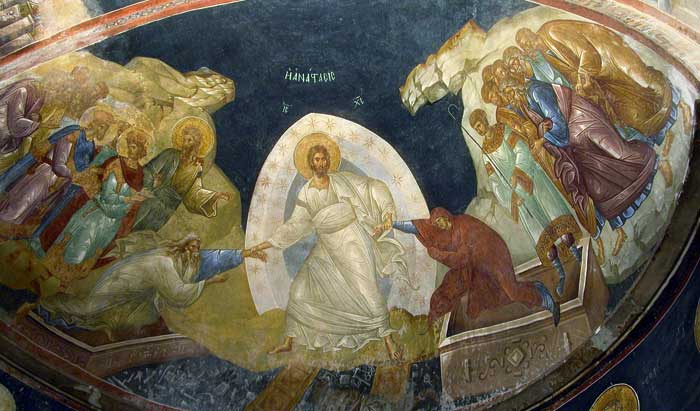
Christ is Risen! Indeed, He is Risen!
Because we always have so many new faces in our community, Fr. Nicholas has given me his blessing to post a brief description of the rubrics for the season. These guidelines are intended by our Holy Church to help us experience the joy of this feast and celebrate our Lord’s victory over death and sin more completely!
FASTING — There is a general dispensation from fasting on Wednesdays and Fridays from Pascha through its Leavetaking (this year, May 27) on the Eve of the Feast of the Ascension. Most Orthodox Churches throughout the world observe the Wednesdays and Fridays of the period following Bright Week as days of abstention and refrain from meat and dairy on those days (fish, wine, and oil are allowed); however, the Holy Synod of Antioch has directed that the entire 40-day period be completely fast-free. The Antiochian practice is actually the more ancient rule. So … feast!
KNEELING — We should not kneel or make prostrations in Church or in our private prayers at home from Pascha through Pentecost (this year, June 7). Kneeling and prostrating are postures of repentance and sorrow for our sins. The brilliant solemnity of the events that we are celebrating takes precedence over such external manifestations of penitence. For our Lord’s death and resurrection “blot[ted] out the handwriting of ordinances that was against us … nailing it to His cross; and having spoiled principalities and powers, He made a show of them openly, triumphing over them in it.” (Col. 2:14,15) Accordingly, “[t]here is therefore now no condemnation to them which are in Christ Jesus …” (Rom. 8:1) For these same reasons, we do not generally kneel on any Sunday of the year as each Sunday is a “mini-Pascha,” commemorating our Lord’s resurrection. We resume kneeling at appropriate times during the “Kneeling Vespers” celebrated after the Divine Liturgy for Holy Pentecost.
PASCHAL HOURS — During Bright Week, our normal prayer rules are altered. The standard Morning and Evening Prayers, the prayers of the Hours, Compline, the Midnight Office, and, according to some traditions, the prayers of thanksgiving after communion, should be replaced with the Paschal Hours. This office of prayer is brief, beautiful, and full of elements taken from the Paschal services. It is intended that praying the Paschal Hours are to give one a respite from the longer prayers he normally prays, so if one’s normal prayer rule is actually shorter than the Paschal Hours perhaps some adjustments are in order. (Obviously, speak to Fr. Nicholas about adjustments.)
O HEAVENLY KING — From Pascha until Pentecost, the prayer “O Heavenly King,” wherein we invoke the presence of the Holy Spirit, is not said either in the Church or in our private prayers at home. Before His passion, Jesus taught His disciples that He must leave so that the Holy Spirit, the Comforter, can come. (John 16:7) The removal of this familiar prayer from the cycle of the services emphasizes the importance of the descent of the Holy Spirit that we celebrate at Holy Pentecost. “O Heavenly King” will be heard again at the Aposticha of the Festal Great Vespers for Pentecost and thereafter returned to our services and prayers.
Blessed Feast to all!
0 Comments